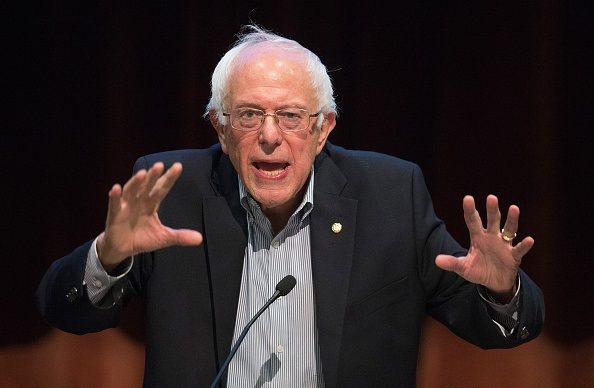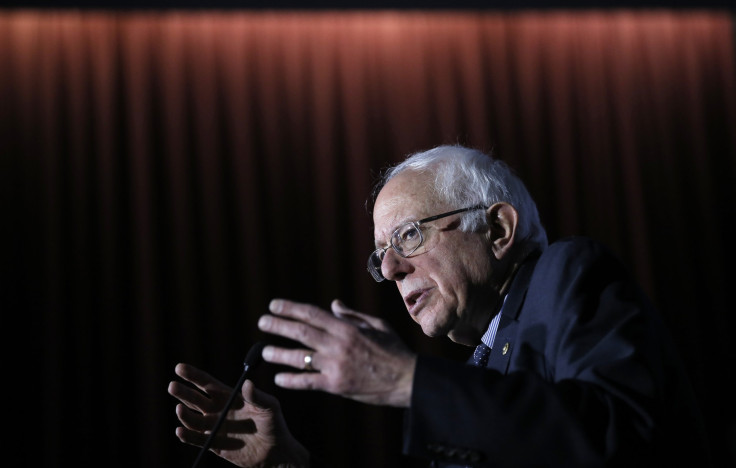Bernie Sanders’ Economic Proposals Undermine Democrats’ Credibility, Former White House Economists Say

Bernie Sanders’ economic proposals are giving Democratic policy wonks some serious pause. Four former White House economists said Wednesday that claims made about his plans could undermine the Democratic Party’s credibility.
After University of Massachusetts, Amherst, economic professor Gerald Friedman published a glowing analysis of the Vermont senator’s economic proposals in recent weeks, four former Council of Economic Advisers (CEA) chairs attacked the claims in an “open letter” published early Wednesday.
Friedman had said Sanders’ plans would cause unemployment to drop to 3.8 percent and raise median incomes by $22,000 to reach $82,000 by 2026, CNN reported. The Sanders campaign’s plans to increase spending on infrastructure and youth employment, expand Social Security benefits and healthcare and make college free would all boost the GDP by 5.3 percent, according to Friedman — far more than Republican presidential candidate Jeb Bush’s promise of 4 percent growth, which many analysts have dismissed as overly optimistic.

“We are concerned to see the Sanders campaign citing extreme claims by Gerald Friedman about the effect of Senator Sanders's economic plan — claims that cannot be supported by the economic evidence,” wrote the economists.
The letter was signed by Austan Goolsbee, Alan Krueger, Christina Romer, who were CEA chairs under President Barack Obama, and Laura D'Andrea Tyson, who served under former President Bill Clinton.
“Making such promises runs against our party’s best traditions of evidence-based policy making and undermines our reputation as the party of responsible arithmetic,” they wrote. “These claims undermine the credibility of the progressive economic agenda and make it that much more difficult to challenge the unrealistic claims made by Republican candidates.”
Remember when former Republican CEA Chairs attacked Jeb! for making unrealistic promises about 4% growth? Oh wait... pic.twitter.com/jW3WK7bmqm
— Matt O'Brien (@ObsoleteDogma) February 17, 2016
Sanders did not commission Friedman’s analysis, but the economist has provided other work for the campaign. The Vermont senator asked Friedman to estimate the cost of his Medicare-for-all plan — which came to $13.8 trillion — and Sanders announced that number with his proposal in January. His policy director, Warren Gunnels, told the Pittsburgh Post-Gazette he would like Friedman’s recent analysis to get more attention.
“It’s gotten a little bit of attention but not nearly as much as we would like,” Gunnels said. “Sen. Sanders has been fighting establishment politics, the establishment economics and the establishment media. And this is the last thing they want to take a look at.”
This criticism from former White House economists comes as the second major blow to Sanders’ economic plan this week. Several left-leaning economists, including Goolsbee, questioned the feasibility of his plans in the New York Times Monday. The topic also came up at the last Democratic debate and has been discussed by Paul Krugman at the Times and Matt O’Brien at the Washington Post’s Wonkblog.
O’Brien recently wrote about how both the incremental changes proposed by Hillary Clinton and the larger changes proposed by Sanders are unlikely to happen unless the Democrats can take control of the House of Representatives from the Republicans. He described the Democratic primary this year as “arguing what's more real: a magical unicorn or a regular unicorn.”
I believe what is required in this moment is to think big. When the people lead, the leaders follow. pic.twitter.com/rRWNAZfOwk
— Bernie Sanders (@BernieSanders) February 15, 2016
Still, Sanders has built his campaign on an outsider message of "revolution" and the critiques of former White House — “establishment,” in Sanders’ language — economists are unlikely to faze his campaign. It’s worth noting that Romer and Krueger, two of the economists who signed Wednesday’s “open letter” have worked as outside consultants for Clinton this election cycle. Goolsbee, whose name appears on the letter and in the New York Times article criticizing Sanders, also works for a consulting firm run by Robert Wolf, a top Clinton supporter.
Those connections don’t negate their economic analysis, but could add ammunition to a Sanders dismissal of the questions. Voters inspired by Sanders’ message may not be swayed by policy wonks debating the outcomes of these policies, but the critiques echo those that Clinton herself has tried to level at Sanders in recent weeks.
In debates and on the campaign trail, she has continued to bring up the idea that Sanders should be honest with voters about what his plans will cost. An email from her campaign Wednesday afternoon featured the subject line “Sanders’ Half-Baked Plans Fail To Prioritize Veterans.”
In response to the criticism of Sanders’ plans, Gunnels, his policy director, told NPR that his campaign has a list of 130 people who have endorsed the senator’s healthcare plan. “That does not bother us at all,” he said, NPR reported. “What bothers us is the fact that the U.S. has more kids living in poverty than nearly any major country on earth.”
© Copyright IBTimes 2025. All rights reserved.






















